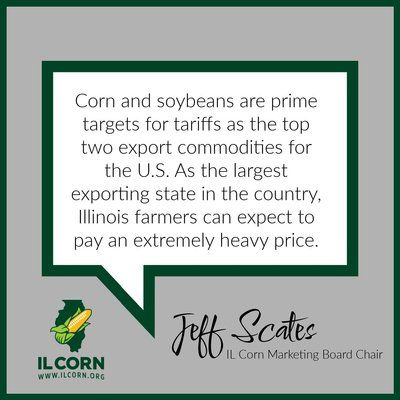Analysis Shows Tariff-Induced Trade War Would Hurt U.S. Farmers

A newly released study reveals corn and soybean farmers would be the losers of any upcoming trade wars, to the tune of hundreds of millions of tons. The study forecasts Brazil and Argentina would claim the lost market share, likely lost to American farmers for decades.
The study specifically investigated the impacts of another potential U.S. and China trade war in which China responds to U.S. punitive tariffs by imposing retaliatory tariffs on corn, soybeans, and soybean products (meal and oil), as would be expected given the 2018 trade war and overall historical precedent.
Exports of both corn and soybeans are important to U.S. farmers, but critical to the bottom lines of Illinois farmers. About half of Illinois corn crop is moved out of state on average, with the majority of those shipments destined for overseas markets via barge to the Gulf of Mexico or by rail to Mexico.
“Corn and soybeans are prime targets for tariffs as the top two export commodities for the U.S. As the largest exporting state in the country, Illinois farmers can expect to pay an extremely heavy price,” said Jeff Scates, Chairman of the IL Corn Marketing Board and farmer in Shawneetown, IL.
Corn and soybeans account for about one-fourth of total U.S. agricultural export value. Farmers and rural economies will lose in a reinvigorated trade war with China during a time of extreme financial stress on farm families.
“The study highlights the dangers that come with broad tariffs on imports,” said NCGA Lead Economist Krista Swanson. “While launching widespread tariffs may seem like an effective tool, they can boomerang and cause unintended consequences. Our first goal should be to avoid unnecessary harm.”
Researchers modeled several scenarios that could play out in a new U.S.-China trade war and found a consistent outcome:
- Severe drop in U.S. exports to China. If China cancels its current waiver (from the 2020 Phase I agreement) and reverts to tariffs already on the books, U.S. soybean exports to China would, according to the study, fall 14 to 16 million metric tons annually, an average decline of 51.8% from baseline levels expected for those years. U.S. corn exports to China would fall about 2.2 million metric tons annually, an average decline of 84.3% from the baseline expectation.
- Brazil and Argentina would benefit. Brazil and Argentina would increase exports and thus gain valuable global market share. Chinese tariffs on soybeans and corn from the U.S.—but not Brazil—would provide incentive for Brazilian farmers to expand production area even more rapidly than baseline growth.
- No place to turn. While it is possible to divert exports to other nations, the study found there is insufficient demand from the rest of the world to offset the major loss of soybean exports to China to support the farmgate value.
The study found that a new trade war would lead to a steep drop in soy and corn prices, resulting in a ripple impact across the U.S., particularly in rural economies where farmers live, purchase inputs, use farm and personal services, and purchase household goods. Other recent studies examining the effects of tariffs have arrived at similar findings.
Read the study, commissioned by the American Soybean Association and the National Corn Growers Association and conducted by the World Agricultural Economic and Environmental Services. IL Corn Marketing Board is an important funding partner of the National Corn Growers Association.







